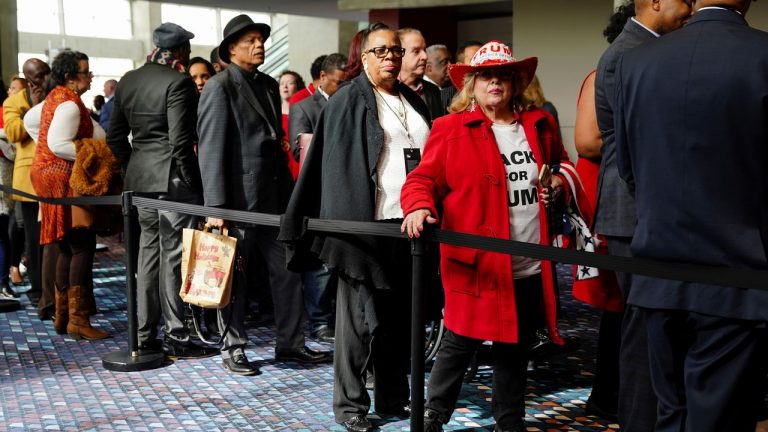Before noon on Friday, as he was leaving the Atlanta Regional Commission’s “State of the Region” breakfast at the Georgia World Congress Center, in downtown Atlanta, Bem Joiner, a local entrepreneur, saw an elderly white couple “walking so jovial towards us,” as he later put it to me, in a direct message. The grinning couple wore matching white T-shirts with black lettering that read “BLACKS FOR TRUMP.” Joiner, who is black, posted a picture of the pair on Instagram. “My homegirl took the pic,” Joiner explained to me, “ ’cause I was too in awe of the situation.” In the caption, on Instagram, Joiner referred to the scene as being something out of “The Twilight Zone.”
In fact, the couple was in the building for the inaugural Black Voices for Trump rally, which was going to begin a few hours later, in a nearby room. Joiner, who described himself as liberal, said that he had no interest in attending the event or in supporting Donald Trump. The President’s national approval rating among African-Americans is around ten per cent, and, in a poll released last month by the Associated Press/NORC Center for Public Affairs Research, just four per cent of black respondents said that Trump had made things better for them. Nonetheless, on Friday, a racially diverse crowd of more than four hundred people, including many African-Americans, turned out to hear Trump speak.
Trump’s appearance in Atlanta was “a gangsta move,” Shelley Wynter, a black conservative radio host, told me, given that the event was held in the congressional district represented by the civil-rights icon John Lewis. In 2017, Trump tweeted that the district, where I live, was “in horrible shape and falling apart,” overlooking the fact that it contains the city’s thriving downtown, the headquarters of Coca-Cola and Delta Air Lines, and several large research universities. (Hours before the rally, Lewis posted a video of himself on Instagram, saying, “Atlanta, my city, is too busy to hate.”) “To come to Atlanta, which is economically, socially, and culturally the heart of the black community in this country—to come to Atlanta as a Republican, as Trump, and roll out a black-voter initiative . . . that’s a gangsta move,” Wynter repeated, hastening to add, “with an ‘A’ at the end.” He went on, “That’s what I love about the guy. You could have done this in New York, you could have done this in any number of places. You could’ve done it in D.C., at the White House. It doesn’t have the same impact. This is in Atlanta and heads are exploding.” Outside the building, a throng of protesters chanted about impeaching Trump and, in a few cases, engaged in shouting matches with attendees.
A young black man wearing dark glasses and a giant foam MAGA hat identified himself as Bryson Gray as he made his way inside. He’d travelled from his home, in Greenville, North Carolina. “I make all the MAGA songs that go viral on Twitter,” Gray told me. (“I just spit the truth, it’s something they don’t understand,” one of his songs goes. “Why is white liberals trying to tell me who I am?”) He added, about the hat, “I don’t get no money from it, unfortunately, even though I went viral with it, too.” Gray explained why he supports the President. “Because of statistics,” he said. “The same way you support your favorite sports players because of the stats they put up.” Among the most important of those statistics, he said, were jobs numbers. “We got the lowest unemployment rate in, what, fifty years?” (The black unemployment rate has recently been at an all-time low, although minority participation in the workforce is not as high as it was the last time that unemployment rates were so low.) “I mean, how could you not support him?” Gray asked. This sentiment—that economic factors underlay black support for Trump—was widely echoed by attendees, who were queued up in a long line waiting to go through security, while people outside sold the “BLACKS FOR TRUMP” shirts that Joiner had spotted.





